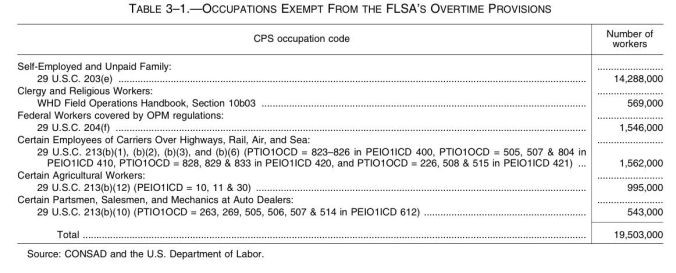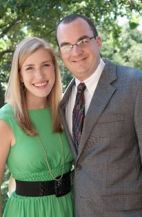Salary Requirement for Overtime Exemption Increases January 1st by John Litzler

[adning id=”33097″ padding=”15″]
[adning id=”33099″ fixed=”1″ size=”full”]

This article was originally intended for religious nonprofit organizations, but contains information relevant to all employers and employees subject to the FLSA
On Wednesday, January 1, 2020, the minimum salary required for “white collar” exemptions to overtime laws will increase from $455 per week ($23,660 per year) to $684 per week ($35,568 per year). The United States Department of Labor estimates that 1.3 million workers will be newly eligible for overtime pay under the new rule. Many of these newly eligible employees work at churches and other religious organizations. Non-ministerial church employees making less than $684 per week are subject to the overtime rules under the Fair Labor Standards Act (FLSA) and are entitled to overtime compensation for all hours worked over 40 hours in a workweek.
Are churches and other religious organizations exempt from the Fair Labor Standards Act?
No. The FLSA applies to ALL employers, even churches and other religious organizations. In order to qualify for minimum wage and overtime protections, however, an employee of a church or other religious organization must be covered under the FLSA. Employees may be covered in one of two different ways. First, if a religious organization is considered a covered enterprise, then all employees of the organization are covered and the FLSA applies to all of the organization’s employees. Second, even if the religious organization is not a covered enterprise, church employees may qualify for individual coverage on a case-by-case basis.
(1) Enterprise Coverage
Non-profit religious organizations are generally not considered enterprises under the FLSA. (Note: Some “named enterprises” are covered enterprises under the FLSA even if they are non-profit, i.e. hospitals and schools) However, if a religious organization engages in commercial activity (as opposed to charitable activity) resulting in $500,000 in sales or business done, then the religious organization will be considered a covered enterprise. Selling items in a church bookstore or coffee shop are examples of commercial activities. Most churches engaging in commercial activities will not meet the $500,000 threshold and will not be considered a covered enterprise. Some churches and other religious organizations, however, do meet the $500,000 threshold and are therefore considered a covered enterprise. Providing shelter, clothing, food, and disaster relief are examples of charitable activity and are not considered commercial activity.
(2) Individual Coverage
If a church or religious organization does not meet the standard for enterprise coverage, then each employee may qualify for individual coverage. An employee that either engages in interstate commerce or produces goods for interstate commerce is covered under the FLSA.
Are ministers exempt from the FLSA?
Yes. Ministers are not subject to FLSA overtime provisions, even if the religious organization qualifies for enterprise coverage or if the minister would otherwise qualify for individual coverage.
The following chart, taken from an April 2004 economic report on the Overtime Rule by the Department of Labor shows that an estimated 569,000 ministers nationwide are exempt from these provisions.

If a non-ministerial church employee qualifies for FLSA coverage, are there any exemptions?
Yes. Even if a non-ministerial employee of a church or religious organization qualifies for individual coverage under the FLSA, exemptions may apply to certain employees based on their job duties and pay. Employees of religious organizations working jobs qualifying as executive, administrative, or professional may qualify for a “white collar” exemption (also known as an EAP exemption).
In order for a non-ministerial employee of a religious organization to fall under the “white collar” exemption, the employee must (1) qualify as an executive, administrative, or professional, (2) be paid on a salary or fee basis and (3) make $684 a week. The first requirement is known as the duties test. The second and third requirements comprise the salary test. It’s the third requirement of this exemption, part of the salary test, that is changing beginning in 2020. In 2016, the Department of Labor, sought to double salary requirement from $455 per week to $913 per week. A court order from a federal judge in Sherman, Texas halted the new rule from taking effect. The new rule would have provided overtime coverage to an estimated 8 million newly qualified employees. The more modest increase to the salary test (from $455 per week to $685 per week) is a compromise.
For non-exempt employees, what hours are counted when determining whether an employee is entitled to overtime pay?
Because members of non-profits often volunteer their time, it can be difficult to tell when a church or religious organization employee is working and should be compensated as opposed to when the employee is volunteering as any other member of the organization would volunteer. An employee cannot simply volunteer or donate free hours of work in order to help the religious organization avoid paying overtime. The Department of Labor has provided several factors to consider when determining whether an employee is serving as a volunteer, including whether:
- The services are entirely voluntary, with no coercion by the employer, no promise of advancement, and no penalty for not volunteering;
- The employee that is volunteering does not replace another employee or impair the employment opportunities of others by performing work which would otherwise be performed by regular employees;
- The services are the kind typically associated with volunteer work;
- The employee offers the services without contemplation of pay; and
- The volunteer services are the same type of services to the non-profit organization that the employee is otherwise typically employed to provide.
The adjustment to the salary test does not affect how the Department of Labor differentiates between work hours and volunteer hours. Historically, the last factor mentioned whether the volunteer services are the same type that the employee would ordinarily provide as part of his or her employment, has been the most difficult for churches.
For example, a children’s ministry assistant should be paid overtime for hours worked at children’s camp in excess of 40 hours that week. This is because working with the children at camp is the same type of services the children’s ministry assistant would ordinarily provide as part of his or her employment. Additionally, because all volunteers must serve without contemplation of pay, religious organizations cannot compensate employees for time served at church camps or on mission trips and still consider the employee’s hours as volunteer hours.
How can churches and religious organizations adjust to the new salary threshold?
When considering the following options, it’s important for religious organizations to remember that we have scriptural and ethical obligations to treat employees justly and fairly. Religious organizations should be reasonable with expectations and with the amount of compensation. Religious organizations should be careful, particularly when adjusting salaries or cutting hours, not to take advantage of employees in an effort to “beat the system.”
- Religious organizations can raise the salary of qualified non-ministerial employees above $685 a week. This may not be the most cost-effective option for every church or religious organization, but it is certainly the simplest. Churches will need to look at each qualified employee’s salary and hours worked to make determinations based on each individual case.
- Religious organizations can continue to pay qualified non-ministerial employees their currently salary but compensate those employees for overtime hours worked. This will require the employees to begin keeping track of the number of hours the employee works each week, if he or she is not already doing so.
- Religious organizations can adjust salaries. Churches can lower the base salary of non-ministerial employees in anticipation of compensating the employee for overtime hours worked. The net result will be compensating the employee a similar amount to the employee’s current compensation. Religious organizations should be very cautious when utilizing this option. Religious organizations should not reduce compensation so low that it violates rules regarding minimum wage.
- Religious organizations can adjust workloads and reapportion work hours. By properly adjusting work to be done and carefully organizing schedules, religious organizations can avoid situations where non-ministerial employees are working more than 40 hours a week.
- Religious organizations can re-assign job duties and write new job descriptions. Remember that only employees engaged in interstate commerce qualify for individual coverage. If a non-ministerial employee is not required to do tasks that involve interstate commerce, the employee will not qualify for FLSA coverage.
If your church would like help in preparing for the changes to the FLSA Overtime Rule or with revising job descriptions, the Church Law Division of Christian Unity Ministries is ready to assist you. Contact us at (903) 243-5576 or e-mail john@christianunityministries.org

John Litzler directs the Church Law division of Christian Unity Ministries in San Antonio. He is a graduate of the University of Texas and Baylor Law school. He is a member of the SSHS class of 2004.
[adning id=”33207″]














